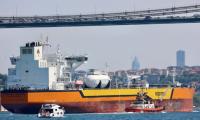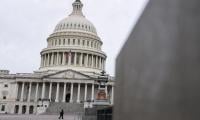Engaging stakeholders for efficient SWM solutions
Islamabad : A number of stakeholders at a consultation meeting realised the importance of adopting innovative ideas and models which provide solutions for managing solid waste in an efficient manner and using it as a resource.
They were of the view that the enormous volume of municipal solid waste generated daily in the twin cities is causing environmental degradation and the authorities concerned should take the bull by the horn and address the serious issue to avert an environmental disaster. Current practices of dumping waste is creating environmental and contributing towards climate changes. Inappropriate waste management contributes to increase not only the emission of water/atmospheric pollutants and odors, but also the emission of greenhouse gases (GHGs).
The consultation meeting of stakeholders which also constituted a project advisory committee for Integrated Resource Recovery Centre (IRRC) Bhara Kahu was held here on Wednesday. The meeting was organised by Dr Akhtar Hameed Khan Memorial Trust in collaboration with Engro Foundation to garner support from the stakeholders for developing a solid waste management (SWM) system for dealing with solid waste in a decentralised manner and replicating the model in other parts of Islamabad.
Capital Development Authority Deputy Director General Civic Management Rafia Haider was the guest of honour on the occasion while others in attendance were Ministry of Climate Change, Deputy Director Dr Zaigham Abbas, Edwin Samson, Board Member, AHKMT, Sumaira Gul, CEO, AHKMT, Asad Shah UC secretary, local government representatives, Favad Soomro, CEO Engro Foundation and Shayan Ahmed from Engro Foundation, Abid Hussain Hashoo Foundation, Anam Hussain, Umar Khan, Urooj Fatima, Almas Shakoor and Pak-EPA representatives. Abid Hussain from AHKMT moderated the meeting.
In his welcome note, Dr. Zaigham Abbas appreciated the initiative and added that MOCC is suggesting a legally binding as policy decision because at present plastic waste has become a global issue that needs to be addressed on urgent basis. He called upon AHKMT and Engro Foundation to collaborate on this aspect of solid waste as well.
Deputy Director General Civic Management CDA Rafia Haider said that she was pleased with the work of AHKMT and Engro Foundation, and stressed the need of taking small steps to address the issue of solid waste. She recalled how urbanisation has led to the massive growth of Islamabad’s population that has dealt a blow to the expectations of city planners. Regretting that waste management had never been a priority of city planners, she hoped that the time has come to address this serious issue more seriously.
Earlier, in her presentation, AHKMT CEO Sumaira Gul explained the role of stakeholders and pointed out that the land required for the project is available with Capital Development Authority and AHKMT is in process of reaching a memorandum of understanding with the authority. “AHKMT will design the IRRC, a system for managing waste from 3000 households and turn around 60 percent green waste into compost and deliver 0.8 tons raw material from plastic waste to industry,” she added. Favad Soomro from Engro Foundation expressed his pleasure that the project was in safe hands and the design is well thought out which is a decentralised approach of addressing the menace of solid waste and hopefully the advisory committee will achieve the desired results.
The advisory committee will be led by a CDA official, while the members will be Director General Pak-EPA Dr Farzana Shah, Favad Soomro from Engro Foundation, Edwin Samson, AHKMT, Dr Tariq Sultan from NARC, Abid Hussain from Hasoo Foundation and Ms Hafsa from NPAP. A number of stakeholders will also name their representatives for the advisory committee after deliberation in their respective organisations.
In his concluding remarks, Edwin Samson said that the meeting was quite fruitful and was joined by all relevant stakeholders and stressed the need for changing behaviours as to how the issue can be addressed hoping the corporate sector will play a due role in achieving the desired goals.
-
 T.I. Says Sons Crossed A Line During His Feud With 50 Cent
T.I. Says Sons Crossed A Line During His Feud With 50 Cent -
 Brooklyn Beckham Ignores Victoria, David Peace Call, Responds To Nicola Peltz Instead
Brooklyn Beckham Ignores Victoria, David Peace Call, Responds To Nicola Peltz Instead -
 Prince Harry, Meghan Markle Can No Longer Be ‘DIY Royals’
Prince Harry, Meghan Markle Can No Longer Be ‘DIY Royals’ -
 Keke Palmer Gets Candid About 'dehumanizing' Child Star Experience
Keke Palmer Gets Candid About 'dehumanizing' Child Star Experience -
 Shamed Andrew Brand ‘most Arrogant’ By Diana Bodyguard
Shamed Andrew Brand ‘most Arrogant’ By Diana Bodyguard -
 Daniel Radcliffe Welcomes New 'Harry Potter' Era, Says It's Time To 'pass It On'
Daniel Radcliffe Welcomes New 'Harry Potter' Era, Says It's Time To 'pass It On' -
 AI Rivalry: Anthropic Investors Push To De-escalate Pentagon Clash Over AI Safeguards, Sources Say
AI Rivalry: Anthropic Investors Push To De-escalate Pentagon Clash Over AI Safeguards, Sources Say -
 Selena Gomez Reveals Handmade Birthday Gift Taylor Swift Created For Her
Selena Gomez Reveals Handmade Birthday Gift Taylor Swift Created For Her -
 Jamie Lee Curtis Doubles Down On Her Assertion About 'The Bear's Imminent End
Jamie Lee Curtis Doubles Down On Her Assertion About 'The Bear's Imminent End -
 Nicole Kidman Reacts To Daughters' Possible Future In Hollywood
Nicole Kidman Reacts To Daughters' Possible Future In Hollywood -
 Harry Styles Weighs In On The Origins Of His Muse While Talking About 'Carla’s Song' From Upcoming Album
Harry Styles Weighs In On The Origins Of His Muse While Talking About 'Carla’s Song' From Upcoming Album -
 Alarming: New Research Suggests Global Sea Levels Have Been Underestimated Due To Flawed Modelling
Alarming: New Research Suggests Global Sea Levels Have Been Underestimated Due To Flawed Modelling -
 Jason Biggs Speaks Of A Possible American Pie Sequel
Jason Biggs Speaks Of A Possible American Pie Sequel -
 Meghan Markle Elated As ‘As Ever’ Proves To Be ‘double Edged Sword’
Meghan Markle Elated As ‘As Ever’ Proves To Be ‘double Edged Sword’ -
 Gulf Shipping Crisis Deepens Amid Geopolitical Tensions: Can Global Powers Manage Oil Supply Shortfall?
Gulf Shipping Crisis Deepens Amid Geopolitical Tensions: Can Global Powers Manage Oil Supply Shortfall? -
 Nicole Kidman Suffers From An Alarming Condition As She Experiences Emotional Fallout Amid Keith Urban Split
Nicole Kidman Suffers From An Alarming Condition As She Experiences Emotional Fallout Amid Keith Urban Split



